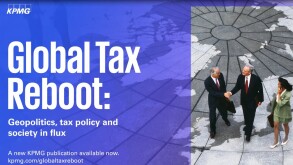The OECD has been working on a package of proposals to deal with tax issues that arise from the increasing digitalisation of economies since 2019. It is an incredibly important area that seeks to address some of the inherent challenges of fitting digitalised businesses into an international framework that was designed for less mobile 'bricks and mortar' business activity and is believed to be no longer fit for purpose.
Governments are engaged in developing solutions that are administrable, promote certainty and do not impede growth, but also produce the right outcomes for economies of all sizes, civil society and individuals. Achieving consensus is not easy given varying views on the nature of the problem to be solved and the diverse interests of the relevant stakeholders. Ultimately, there is no 'one size fits all' solution.
The work to date adopts a two-pillared approach:
Pillar one seeks to reallocate some profits to the user or market jurisdiction. This is to deal with concerns that businesses generate value from market jurisdictions (particularly through interaction with consumers and access to user data), but the associated revenue is subject to minimal tax in the market jurisdiction due to a lack of physical nexus required under current rules.
Pillar two proposes a global minimum tax which is intended to address the incentives to shift profits based solely on tax outcomes. Countries competing to attract inward investment may offer tax incentives or lower tax regimes. In addition, differences between domestic tax rules may create opportunities for multinationals (particularly those that derive significant value and profit from intangibles) to move income and profit to these low tax jurisdictions. This can create inappropriate tax competition and result in a ‘race to the bottom’.

The success of the OECD project is dependent on having sufficient buy-in from nations, so that there is a global will to implement any new framework.
The OECD’s aim is to have that agreement by mid-2021. Towards the end of 2020, the prospects for success looked dim, as the US government expressed increasing concerns that pillar one was unfairly targeting US companies, insisting that it would only accept an elective approach to pillar one, and requesting a postponement of discussions.
This blew cold winds over the process and raised doubt as to whether the goal of achieving agreement by mid-2021 could reasonably be met.
Warmer winds from the Biden administration
The past few months have seen a significant shift however, as the Biden administration has signaled the US commitment to fully re-engage with the OECD to reach consensus on a two-pillar solution.
Further to this commitment, the US Treasury has withdrawn its insistence on a safe-harbour approach to pillar one, set out an alternative proposal, and expressed support for the adoption of a global minimum tax. The US proposals sit alongside a package of proposed domestic tax reforms set forth by the Biden administration, which include a hike in the federal tax rate to 28% and a redesign of the GILTI regime (the US version of a minimum tax regime) which would, among other things, increase the GILTI tax rate to 21% and apply the regime on a jurisdiction-by-jurisdiction basis.
US engagement is welcome in moving the talks forward and, without doubt, US endorsement of a global minimum tax will be critical to whether the proposals can succeed and progress to implementation. If successful, the OECD proposed changes, particularly the adoption of a global minimum tax, will be significant and foundational.
The frosty tail of Biden’s global minimum tax?
A potential impact of the Biden administration’s vigorous support for the pillar two global minimum tax is the extent to which the proposed changes to the US GILTI’s regime may influence the design of pillar two, both in terms of the tax rate itself and the basis on which any global effective rate is calculated.
The Biden administration proposed raising the domestic GILTI rate to 21% and, initially, expressed a desire for the pillar two global minimum tax rate to be set at the same level. However, previous discussions at the OECD had focused on a minimum tax rate of between 10% and 15%, with a growing coalescence around approximately 12.5%.
At a global minimum tax rate of 12.5%, many countries would still be able to introduce some tax incentives without triggering minimum tax concerns. However, a near doubling in the minimum rate to 21% would have changed this dynamic significantly.
The Biden administration has since softened its approach and said it would accept a global minimum tax rate of 15% or higher.
The rate of any global minimum tax will fundamentally drive the number of countries’ tax regimes that will be within the scope of the tax. Ireland, for example, has a corporate tax rate at 12.5%, and with a minimum tax rate in the region of 21%, could have seen significant tax revenue loss. Ireland previously supported a global minimum tax of, not surprisingly, 12.5%.
However, a near doubling of the proposed global minimum rate to 21% would have significant impact on its ability to attract inward investment as mentioned above.
Paschal Donohoe, the Irish finance minister, has said he would support a minimum rate that allowed ‘appropriate and acceptable’ tax competition which he believes is especially critical for smaller economies to allow them to compete with larger economies.
With the US now stating that it will accept a global minimum tax of 15% or higher, this will allay some concerns, and not just those expressed by Ireland, as other jurisdictions also expressed concerns that a 21% global minimum was too high.
The second element of the counter proposal by the Biden administration is that any global minimum tax should be calculated on a jurisdiction-by-jurisdiction basis rather than a global basis. This was still technically an open point at the OECD discussions, although the direction of travel was favoring a jurisdictional basis of calculation. The US’s effective endorsement of this approach however makes it more likely to happen.
The difference between calculation methods is important. A global approach would allow a multinational to blend high tax and low tax profits, effectively allowing taxes paid in higher tax jurisdictions to shield lower taxed income. This would limit the scope of the global minimum tax.
As previously stated, this change in scope needs to be considered in the context of Biden’s wider domestic tax reform. The GILTI regime currently operates on a global basis and Biden is proposing that this moves to a country-by-country basis. Again, Biden is seeking the OECD’s global minimum tax regime to align with the US GILTI regime.
The effect of a global minimum tax on tax policy
Since the US’s re-engagement with the OECD process, there has been a change in the mood music with many commentators now believing that an international consensus on both pillar one and pillar two is possible and perhaps even imminent. With a global minimum tax around the corner, it is useful to consider its impact on tax incentives and policy making.
Any global minimum tax operates to limit a national government’s ability to exercise tax policy how it sees fit. As such, it must balance a nation’s right to sovereignty with a policy objective of making much needed updates to global taxing frameworks. In our view, most jurisdictions will accept some element of limitation on tax policy, particularly if they see a broader benefit from the wider package of the OECD reforms.
In its simplest form, the OECD’s global minimum tax proposal involves paying a ‘top-up tax’ at the level of the parent company if income made further down the ownership chain has been taxed below the global minimum rate. The blueprint is targeted at profit shifting involving intangibles rather than substance-based incentives (such as for manufacturing activities).
If enacted, the imposition of a global minimum tax will have significant impact on the use of tax incentives.
1. Firstly, it neutralises the low tax incentive. If a government in country X offers a beneficial regime, such as an IP box, which results in a significantly reduced rate of taxation, this will be of no benefit if a multinational has to pay a top-up tax in relation to that income in the parent jurisdiction. The tax incentive to invest into country X has disappeared. Where tax is an important driver in the decision, this may result in the investment in country X not happening at all.
2. Secondly, a global minimum tax may result in tax revenues effectively being exported to other jurisdictions. Imagine a scenario in which a multinational is going to invest in country X irrespective of the tax incentive; the incentive operates to reduce the tax paid in country X, but there will still be a ‘top-up tax’ to pay in the parent jurisdiction. Where the investment would have happened anyway, country X is worse-off by offering the incentive compared to if it had offered no incentive. It has effectively subsidised another country’s tax revenues.
Inevitably a global minimum tax will put pressure on those countries who have headline rates below the global minimum to increase their domestic rates, especially if not doing so will effectively export tax revenues. Ireland has indicated that it does not anticipate increasing its rate from 12.5% but inevitably this looks more viable with a 15% global minimum rate over a 20% rate.
Are tax incentives dead?
Some governments believe that an element of appropriate tax competition should still be allowed by any global minimum tax regime, especially for smaller nations in order to enable them to compete with larger countries that have inherent economic advantages. But the ability to offer tax incentives will be fundamentally impacted by the reach of any global minimum tax regime.
We can expect to see a range of responses. It may lead to governments seeking to incentivise through subsidies or grants rather than tax reliefs, although international state aid and anti-subsidy rules might limit this.
If the final global minimum rate is closer to 15% than 21%, the effect on tax incentives will be reduced, but they will still be impacted and become less effective.
We may see other policy initiatives where tax incentives are built around economic zones that offer certain benefits, but with any tax incentives being focused on property taxes or employer social security contributions, (those taxes that do not form part of any global minimum tax regime) any proposals of this nature are likely to meet strong challenges from opposing political parties and other public interest groups around concerns that such measures create tax haven ‘pockets’.
Some careful thought needs to be given to the impact on noble incentives in areas such as environmental taxes. Tax is often used to encourage certain behaviours. Most environmental tax policy acts along carrot and stick lines. Bad behaviour is penalised through taxes and good behaviour is incentivised through tax reliefs.
A wide-scope global minimum tax removes the tax relief side of the equation as a policy option, which will limit a government’s ability to drive behaviours. At the extreme, a taxpayer may be relaxed about incurring higher taxes in country X, stemming from bad environmental practices, if it would incur top-up taxes elsewhere, if it followed ‘good behaviour’. The overall tax burden is not reduced as a result of implementing good practices.
If we assume an eventual global minimum tax rate of 15%, or slightly higher, we will likely still see some tax-based incentives and substance-based incentives survive. Over time, however, we could see a shift to competition on non-tax platforms or in relation to non-profit based taxes.
Secondary policy implications of a global minimum tax regime
A global minimum tax regime is not an attempt to harmonise taxes; instead, it is there to set guardrails within which a country is expected to operate.
However, the methodology for taxing any global minimum tax rate will inevitably redefine what is an acceptable tax base, what is an acceptable tax, and what is an acceptable tax rate. As such, the impact of the minimum tax may shape tax policy more over time.
We may start to see an increasing homogeneity of different countries’ tax bases as well as the types of taxes employed as governments seek to ensure that their tax system is not disadvantaged by the minimum tax calculation methodology.
Tax base
The starting point for the OECD proposals is the accounting profit. The proposals then allow a limited and predetermined set of adjustments to arrive at the taxable base. If these do not align well with those permitted under local legislation, then there is a risk that the two different tax base calculations will look very different, which will feed into whether the minimum tax applies or not.
The most obvious factors here are permanent differences where the OECD have suggested limited adjustments and timing differences relating to book-to-tax differences on assets and loss carry-forwards etc.
The UK has quite a broad tax base already, which is one of the reasons why its current headline tax rate of 19% is not as good news as it appears. A broad local tax base will be an advantage in the calculation of global minimum tax as applying a low rate to a broad base will increase the local effective tax rate. The proposed UK corporate tax rate increase to 25% will also help.
Covered taxes
Another factor is the question of what taxes are respected for the purposes of the calculation of ‘tax’ (called ‘covered’ taxes). As a general rule, those taxes that are applied to profit will be recognised for global tax purposes.
A notable exclusion is digital services tax (DST). Unilateral DSTs have sprung up over the last few years as a reaction by market or user economies to increasing digitalisation. DSTs apply to revenue rather than profit; they are therefore not currently respected in the global minimum tax regime. This may not be too much of an issue. The US has already stated that it expects a commitment that unilateral measures will be repealed as part of its agreement to the OECD proposals, and the exclusion of DSTs from the minimum tax calculations aligns with this US narrative. However, it is interesting to note that the UK has currently held off on backing the US global minimum tax proposals until there is more clarity on how digital technology giants are to be taxed.
Over time, the effect of the calculations may lead to governments adopting tax policies that increase the tax base or at least align it with the OECD calculation methodology and/or move to taxes that are recognised for the purposes of any global minimum tax calculation.
The UK is an interesting case in point here. The 100 Group is a forum of the largest UK headquartered businesses, which publishes an annual report showing their combined total tax contribution. The report also highlights trends over time. The latest report shows that, in 2005, approximately 50% of taxes borne represented corporation tax.

By 2019/20 that had dropped to 25%. As the report states, ”There has been a consistent trend away from a tax based on profits to taxes based on people, production and property.”
Non-profit based taxes can be an attractive policy as they represent a more stable revenue stream that is less vulnerable to economic fluctuations. But they will have a negative impact on a country’s overall investment tax burden if there is a local bias towards non-profit related taxes and the country’s main corporate tax regime falls within the global minimum tax measures. Restructuring those taxes so that they are respected for global minimum tax purposes would bolster the jurisdiction’s general position vis-à-vis the global minimum tax regime and might also provide headroom to allow for some limited tax incentives.
Global minimum tax and recovery in the wake of COVID-19
Tax policy does not operate in a tax vacuum. Attracting inward investment generates a wider ripple effect in the economy. Where a multinational invests in a presence, it needs office space and local hires and this can create construction work, encourage the establishment of cafes and restaurants close to the office, etc. The physical footfall of investment produces its own flourishing microeconomy.
In a post-COVID world, where all countries will be looking to rejuvenate their economies, there may be some concerns that a global minimum tax could cause that economic recovery to stutter, particularly in countries that are heavily reliant on the inward investment encouraged by tax incentives.
The flip side of this, however, is that it’s possible a higher global minimum tax rate might encourage nations to increase their domestic rates across the board. The UK and the US are first movers in announcing corporate tax rate increases. In isolation, this could look foolhardy, but the real test is one of international comparison. A 6% tax hike for the UK is only competitively rash if no other large economies follow suit; the UK and the US breaking cover may encourage others to do the same.
What next?
The latest intervention from the US has rejuvenated the debate on both pillars of the OECD proposals, and US support is crucial if these measures have any hope of success. But actual implementation of a global minimum tax still looks fiendishly difficult and there is a long and challenging road ahead.
The US proposals will change the dynamic of the debate and shift negotiating positions, particularly in those countries that will be negatively affected by them. There is still huge uncertainty, however, over whether Biden’s domestic tax reform agenda will get over the line in Congress and, without that, it is difficult to see how his ideas for the global minimum tax will survive.
Pillar one and pillar two are a package. Different economies have different priorities in relation to the pillars. The UK, for example, prioritises resolution of the digital issue, which falls under pillar one. It views any solution to be not just about a minimum tax but, critically, about the location of where tax is paid. The UK has signaled that it will take pillar two with pillar one as part of a consensus deal, but only if there is a satisfactory resolution on digital issues. Other countries see pillar two as the more critical pillar. But by binding both pillars together as a package, the overall appeal is widened.
There is a broad acceptance that the increasing digitalisation of businesses must be dealt with in the tax world in a way that produces equitable outcomes for all stakeholders.
Whilst this will be very difficult in practice, the consensus appears to be that a global minimum tax will come to pass, not least because the alternative would be more disruptive. Inaction will lead to a plethora of unilateral measures that seek to fix problems on a bespoke per-country basis outside of an international framework.
That will inevitably lead to double taxation and complex international disputes. It also has the potential to lead to more damaging political and economic ramifications such as trade wars.
It has been suggested by some that a global minimum tax is an 'easy fix' for leveling the playing and achieving so-called fair taxation of multinationals. But tax rules are complex and understanding the interaction of different tax systems can be like playing three-dimensional chess: it is not intuitive, there are many moving pieces, and the moves are interdependent!
At the end of the day, this debate may become about achieving tax peace in a very disrupted world. Thus, a solution that achieves an element of certainty that allows governments to focus attention on fixing economies ravaged by the global pandemic may be welcome, even if that solution is not ideal. That may ultimately be a good thing, but it’s definitely not an 'easy fix'.

































